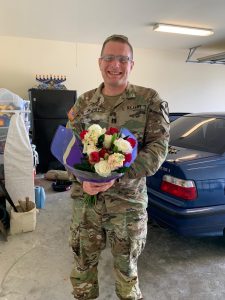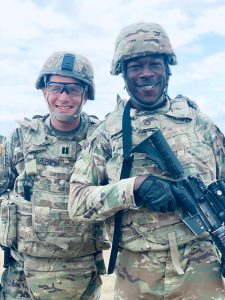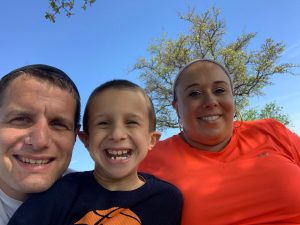I Go Where I’m Needed
Rabbi Dovid Egert, Chaplain of the US Army
Chaya Sarah Stark
The name Dovid Egert conjures images of Bike4Chai, Camp Simcha’s yearly biking event, where participants bike to the Catskills as a fundraiser for the camp for children with cancer. Dovid initiated the program by being the first person to bike from Lakewood to Camp Simcha, in Glen Spey, New York, raising $10,000 for the organization in the process. As the story goes, he came to the bus stop in Lakewood to meet the bus that would drive him up to camp. When the driver refused to let him board the bus with his bike, he uttered the words that would set into motion a legendary program that now boasts hundreds of bikers each year from all over the tristate area: “Ok, I’ll meet you at camp.”
Ever wonder what happened to the originator of the Bike4Chai program? What has he done with all that energy and zest for life? Meet Rabbi Dovid Egert, a chaplain for the United States army, who is currently stationed in Fort Bragg, North Carolina. He joined the army in September of 2017, because in his words, (only half in jest), “I needed a steady paycheck and benefits.”
Military Man
 Dovid’s paternal grandfather served as a GRUNT soldier in the Philippines during World War II. He was a role model that Dovid chose to emulate, albeit in a different capacity. Dovid went through basic training (as every soldier does) before becoming a chaplain. Although most soldiers complain about the physical hardships, and some even drop out from the stress involved, Dovid says that he enjoyed it. His training included basic officer leadership training, in addition to thirteen weeks of chaplaincy instruction, at Fort Jackson, South Carolina; in 2018, he was promoted to captain. Pirchei Shoshanim, an organization in Lakewood run by Rabbi Fischel Todd and his son Rabbi Yosef Todd is where Dovid became Rabbi Dovid Egert, in addition to receiving his master’s degree. He also independently received certification as an EMT.
Dovid’s paternal grandfather served as a GRUNT soldier in the Philippines during World War II. He was a role model that Dovid chose to emulate, albeit in a different capacity. Dovid went through basic training (as every soldier does) before becoming a chaplain. Although most soldiers complain about the physical hardships, and some even drop out from the stress involved, Dovid says that he enjoyed it. His training included basic officer leadership training, in addition to thirteen weeks of chaplaincy instruction, at Fort Jackson, South Carolina; in 2018, he was promoted to captain. Pirchei Shoshanim, an organization in Lakewood run by Rabbi Fischel Todd and his son Rabbi Yosef Todd is where Dovid became Rabbi Dovid Egert, in addition to receiving his master’s degree. He also independently received certification as an EMT.
Dovid moved to Fort Bragg just a few weeks ago with his wife Shira and son Ezriel, age 7. Until that time, he served as chaplain of the Special Troops Battalion, 1st Cavalry Division Sustainment Brigade in Fort Hood, Texas, where the family occupied a spacious, three-bedroom, 1600 square-foot ranch on the base. The nearest Jewish community was in Austin, 60 miles away, where the Egerts traveled biweekly to stock up on kosher food, Judaica, and other necessities not available on the base.
“Everything is bigger there,” Dovid says of life in Texas. “I loved it.” For a state famous for its ten-gallon hats and 24-ounce steaks, it is an apt description.
Ezriel attends public school but learns with Dovid in the evenings. Ezriel’s grandfather, Rabbi Meir Egert is a primary Rebbe at the Lakewood Cheder. He, too, learns with Ezriel each day over the phone. Ezriel made friends with other “army brats”, the affectionate term used for children of full-time military personnel, although he is the only Jewish child.
The Egerts are given thirty days of leave each year. They spend that time in Lakewood, and during that time Ezriel attends yeshivah there. Shira is a homemaker and mom to Ezriel. She helps her husband run Jewish services and caters meals for the Jewish soldiers from the surrounding areas. Dovid says that kosher food is available in limited quantities in the commissary on the base.
Life of a Chaplain
There are 13 chaplains on active duty in the United States army and six rabbis who serve in the navy. Every aspect of Jewish life is covered by the chaplaincy. On a practical level, Dovid officiates at weddings, funerals and brissim that he arranges, all paid for by the army. He is the rabbi on weekends and hosts Shabbos dinner in his home. Yomim Tovim involve intense preparation and planning. Last year, Rabbi Egert organized a Seder for 100 soldiers on the base, in the chapel. Dovid never knows how many people will be in attendance. “Sometimes it was just G-d and me in attendance,” he quips. Dovid has also koshered kitchens and arranges all chapel services.
 Dovid’s responsibilities also include counseling. Issues that are covered in the sessions are difficulties in marriage, issues with children, and of course the existential questions covered in Judaism. The former Lakewood yeshivah boy has developed a reputation as the expert on all Jewish matters.
Dovid’s responsibilities also include counseling. Issues that are covered in the sessions are difficulties in marriage, issues with children, and of course the existential questions covered in Judaism. The former Lakewood yeshivah boy has developed a reputation as the expert on all Jewish matters.
Life as a chaplain was somewhat impacted by COVID-19 with strict mask and social distancing enforcement on the base, although Dovid is thankful to report that there were no deaths. Despite the pandemic, Dovid, who has been donating blood regularly for over a decade, planned bimonthly blood drives for his unit.
In line with his reputation as a trustworthy soldier with impeccable professional behavior, Dovid was asked to go to Europe in 2018 to lead services for the High Holy Days. His whirlwind trip included Rosh Hashanah in Germany, Yom Kippur in Hungary, a week in Prague, and a week in Poland. The Chabad shaliach in Bulgaria proved to be particularly helpful to Dovid, and a close friendship developed between the two. He also spent time at the Mihail Kogălniceanu air base in Romania. Dovid praises the Chabad shluchim in each of these countries for supporting his mission and supplying him with whatever he needed. He was inspired by Jews all over Europe who opened their minds and hearts to him and offered him their help in any capacity.
Over the course of his career, David has amassed several awards, including the Army Achievement Medal and Certificate of Achievement for support of the Black Sea Area Support Unit Ministry team. He earned the Norwegian Foot March badge for completing an 18.6-mile road march while carrying a 25-pound rucksack in memory of Chaplain Emil Kapaun.
Just before he relocated to Fort Bragg with his family, Dovid was presented with a commendation medal in honor of his exceptional service at Fort Hood.
 Looking to the Future
Looking to the Future
Dovid does not know how long he will be stationed in any particular place. The army can relocate a soldier based on need to anywhere in the free world. In fact, Dovid’s initial assignment was to go to South Korea! Much to his parents’ and family’s relief, he was reassigned to Fort Hood.
 “I go where I’m needed,” says Dovid. These words are his guide to helping other Jews, and his response to being re-stationed or reassigned to anywhere else in the world.
“I go where I’m needed,” says Dovid. These words are his guide to helping other Jews, and his response to being re-stationed or reassigned to anywhere else in the world.
 What are Dovid’s plans for the future? He plans to stay in the army. His goal is to achieve the highest rank in the chaplaincy, which is that of two-star general. He began his career as a second lieutenant, moved on to first lieutenant and at present holds the rank of captain.
What are Dovid’s plans for the future? He plans to stay in the army. His goal is to achieve the highest rank in the chaplaincy, which is that of two-star general. He began his career as a second lieutenant, moved on to first lieutenant and at present holds the rank of captain.
Dovid has come a long way from his days in Lakewood. While focused on making a kiddush Hashem wherever he goes, he continues to live by his motto: “I go wherever I am needed.”
You must be logged in to post a comment.